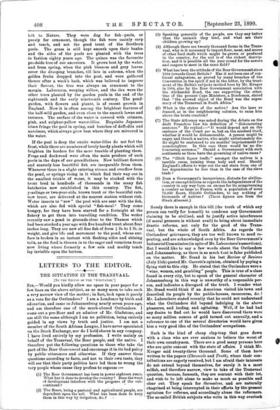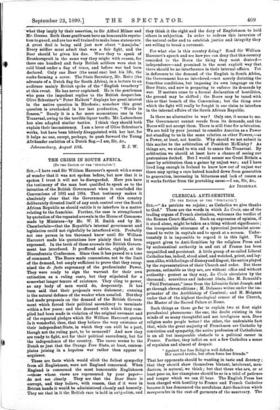LETTERS TO THE EDITOR.
THE SITUATION IN THE TRANSVAAL.
[To TUE EDITOR OF TILE "SPECTATOR."]
Stn,—Would you kindly allow me space in your paper for a few lines on the above subject, as so many seem to take such a very narrow view of the matter ; in fact, look upon it purely as a vote for the Outlanders ? I am a Londoner by birth and education, and came to Johannesburg nearly seven years ago, and am therefore one of the much-abused Outlanders. I came out a pro-Boer and an admirer of Mr. Gladstone, and am still the same although I am no politician, being entirely guided in my views by truth and justice. I am not a member of the South African League, I have never speculated on the Stock Exchange, nor do I hold shares in any company.
I have lived entirely by my profession. I write mainly on behalf of the Transvaal, the Boer people, and the native. I therefore put the following questions to those who take the part of the Boer Government and encourage it in its bad policy by public utterances and otherwise. If they answer these questions according to facts, and not to their own taste, they will see that their party politics have led them to wrong the very people whose cause they profess to espouse :-
(1) The Boer Government has been in power eighteen years. What has it done to develop the country? Does the want of development interfere with the progress of the sub- continent ?
(2) The Boers, being a pastoral and agricultural people, are dependent upon the soil. What has been done to keep them in this way by irrigation, &c. ? (3) Speaking generally of the people, are they any better than the animals they tend, and what are their children growing up ?
(4) Although there are twenty thousand farms in the Trans- vaal, why is it necessary to import flour, meat, and scores of other food stuffs which might be grown or produced in the country, for the soil is of the richest descrip- tion, and it is possible all the year round for the sowers and reapers to meet in the same field ?
What has been the attitude of the Boer Government since 1884 towards Great Britain ? Has it not been one of con- tinual antagonism, as proved by many breaches of the Convention in the spirit if not in the letter, by the treat- ment of the British subjects invited here by Mr. Kruger in 1884. also by the Boer Government association with the Afrikander Bond, the one supporting the other. One of the present Cape Ministers, a Bondsman, stated that " the avowed object of the Bond was the supre- macy of the Transvaal in South Africa."
What is the status of the native ? Are the laws so framed, as in the neighbouring colonies, to raise him above the brute creation?
The State Attorney was asked during the debate on the draft Franchise Law his definition of " dishonouring sentence." He replied :—" It would depend not on the sentence of the Court per se, but on the misdeed itself, whether it would be dishonourable. A person might be angry and thrash a native, who might unfortunately die. He might be sentenced to six months' imprisonment for manslaughter. In this case there would be' no dis- honouring sentence." Should a Government with such sentiments as these have the governing of native races ?
The "illicit liquor traffic" amongst the natives is a terrible curse, ruining them body and soul. Should England's efforts to wipe out the sad stain from one of her dependencies be less than in the case of the slave trade ?
Does a Government's inexperience, distaste for civilisa- tion, or susceptibilities as regards the independence of the country in any way form an excuse for its misgoverning a country as large as France, with a population of some 78,000 Boers, 210,000 Outlanders, to say nothing of thousands of natives ? (These figures are from the Staats Aimanak.)
Surely there is enough in this bill (the truth of which any person can verify for himself) to condemn any Government claiming to be civilised, and to justify active interference (if moral pressure is without avail) to bring about immediate drastic reforms, not only for the good of the Trans- vaal, but the whole of South Africa. As regards the Outlanders' grievances, they are too well known to need re- peating, and are acknowledged even by the Boer Government's Industrial Commission (in spite of Mr. Labouchere's assertions). Bat I would like to say a few words about the Outlanders
and Johannesburg, as there is so much twat is false published on the matter. Mr. Stead in his last Review of Reviews (July 15th) quoted Mr. Garrett's opinion, obtained by paying a flying visit to this city. He stated that the Outlanders were a "wine, women, and gambling" people. This is true of a class found in every city, but to speak of the general character of Johannesburg in this way is unworthy of a responsible per- son, and indicates a disregard of the truth. I wonder what Mr. Stead would think if an American visited his town and
described its people by the public-houses, racecourse, &e.! Mr. Labonchere stated recently that he could not understand what the Outlanders did beyond indulging in the above pleasures, and loafing, and agitating. Well, if he had had any desire to find out he would have discovered there were so many million ounces of gold turned out annually, and a reference to one of the several directories would have given him a very good idea of the Outlanders' occupations.
Such is the kind of cheap clap-trap that goes down with a class who are ever anxious to believe the worst of their own countrymen. There are a good many persons here who are quite content with the state of affairs. I think Mr. Kruger said twenty-three thousand. Some of them have
written to the papers (Chronicle and Truth), where their con- tributions are eagerly received, but I am afraid their interests do not extend beyond themselves, for surely it is a most selfish, and therefore narrow, view to take of the Transvaal
question, because, forsooth, they are content with their lot, and wish to be left alone to make as much as possible and clear out. They speak for themselves, and are naturally chagrined at being interrupted in their efforts by the present agitation for reforms, and accordingly abuse the reformers.
The so-called British subjects who write in this way overlook
what they imply by their assertion, to Sir Alfred Milner and Mr. Greene. Both these gentlemen have an honourable reputa- tion to guard, and are too well trained to make loose statements. A great deal is being said just now about " Amajoba.'' Every soldier mast admit that was a fair fight, and the Boer should be given his due. Were they to speak of Bronkerspruit in the same way they might with reason, for there one hundred and forty British soldiers were shot in cold blood under a flag of truce, and before war had been declared. Only one Boer (tbe usual one) lost his life, the rocks forming a cover. The State Secretary, Mr. Reitz (the advocate of a Dutch flag for South Africa), in a lecture to an audience mainly British spoke of the " English treachery " at this event. He has never explained. He is the gentleman who pens the impudent replies to the British despatches. Olive Schreiner's " Peter Halkett" displays her great interest in the native question in Rhodesia ; somehow this great question is overlooked in her last production, " Words in Season." Surely it is a far more momentous one in the Transvaal, owing to the terrible liquor traffic. 11r. Labouchere has also adopted similar tactics. I think they should both explain their inconsistency. I am a lover of Olive Schreiner's works, but have been bitterly disappointed with her last, for it helps no one, except, perhaps, to push forward the Young Afrikander ambition of a Dutch flag.—I am, Sir, &c.,



































 Previous page
Previous page